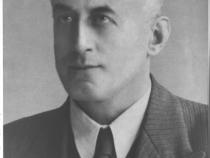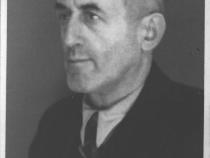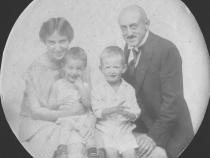Location
Reifträgerweg 19
Historical name
Augustastraße 19
District
Schlachtensee
Stone was laid
26 April 2013
Born
14 February 1881 in Berlin
Occupation
Reichswirtschaftsgerichtsrat
Verhaftet
11 November 1938 to 01 December 1938
in
Sachsenhausen
Death due to incarceration and torture
08 January 1939 in der Wohnung im Reifträgerweg
Friedrich Guttstadt was born on 14 February 1882 in Berlin, the son of distinguished medical adviser Prof. Dr. Albert Guttstadt. Friedrich grew up near Nollendorfplatz in Schöneberg. He had an older brother, Richard Guttstadt, who was brutally murdered in Mauthausen and in whose memory a Stolperstein has been laid at Sophien Strasse 10 in Frankfurt (Oder).
After attending the school Falk Realgymnasium, Friedrich Guttstadt studied law. He spent the years 1900-1901 as a student in Strasbourg, where he joined the Cheruscia-Burgund academic sports association. He remained local to this fraternity-type association all his life, joining the Berlin branch in 1906 and co-founding the old-timers’ association in 1911.
Friedrich Guttstadt served in the First World War and was awarded the Iron Cross. In 1916 he became a circuit judge in Bochum. Here he married Margarete Lipinski, two years his junior and the daughter of a brewery director from Bochum, in 1919. Margarete had just completed her final exams to become a teacher. In 1920 their son Albert was born and in 1922, Gerhard. In 1923 Friedrich Guttstadt moved with his family back to Berlin. He is listed in the 1923 Berlin directory as a judicial counsellor (Landgerichtsrat), resident at Landhaus Strasse 42. From about 1925 he worked at the Reich economic court. From 1933 the Guttstadt family lived in Dallwitz Strasse in Zehlendorf.
Friedrich Guttstadt had some Jewish ancestors; he himself was a Protestant Christian. It is not known how long he continued to serve as a judge after the Nazis’ rise to power. He left the Cheruscia-Burgund sports association along with other members with Jewish roots in December 1934, presumably to pre-empt being thrown out.
In May 1934 Friedrich Guttstadt bought a plot of land to build a house on; in summer 1935 he and his family moved into their new home at Augusta Strasse 19, today Reifträger Weg, in Nikolassee. But even the Guttstadts suffered from the increasingly prevalent racism. Their older son Albert was conscripted to the Reich Labour Service. In October 1938 he was critically injured while on duty in the territory of the Saar Basin. Margarete Guttstadt described the following events in a letter to relatives in 1947:
“…I told my husband on the telephone that I would take my boy to a Berlin hospital. […] in Berlin my husband was going to wait for us with helpers from the hospital. The morning that I arrived in Berlin with my sick son, my husband was not at the station. That very night the Gestapo had taken him to a concentration camp and I didn’t know where he was …”
“…I went to look for my husband in the concentration camp near Berlin. They didn’t want to let me in. But I managed to get in by telling a lie: I said I was from the English press and had to talk to the commander. I had a letter for him. (I had written the letter myself). They gave me two SS men with rifles over their shoulders and took me to the commander’s adjutant. I asked him about my husband who had been taken away by the Gestapo. When he heard that I was not from the ‘English press’ (I had chosen that lie because I had happened to hear that he wanted to visit the English press that day), he wanted to shoot me but I told him he could give me my husband and I would give him my jewels … Eventually my husband came. He had been in the camp for three weeks, but he was a broken man and died a short time later. I can never forget the desolate look in his eyes. He had been quite well and in the best of health when I had last seen him, when he put me on the train to Saarbrücken; he was a broken and sick man when he came out of the c. camp. My son was in hospital for 7 months, but I am glad – he was saved.”
After attending the school Falk Realgymnasium, Friedrich Guttstadt studied law. He spent the years 1900-1901 as a student in Strasbourg, where he joined the Cheruscia-Burgund academic sports association. He remained local to this fraternity-type association all his life, joining the Berlin branch in 1906 and co-founding the old-timers’ association in 1911.
Friedrich Guttstadt served in the First World War and was awarded the Iron Cross. In 1916 he became a circuit judge in Bochum. Here he married Margarete Lipinski, two years his junior and the daughter of a brewery director from Bochum, in 1919. Margarete had just completed her final exams to become a teacher. In 1920 their son Albert was born and in 1922, Gerhard. In 1923 Friedrich Guttstadt moved with his family back to Berlin. He is listed in the 1923 Berlin directory as a judicial counsellor (Landgerichtsrat), resident at Landhaus Strasse 42. From about 1925 he worked at the Reich economic court. From 1933 the Guttstadt family lived in Dallwitz Strasse in Zehlendorf.
Friedrich Guttstadt had some Jewish ancestors; he himself was a Protestant Christian. It is not known how long he continued to serve as a judge after the Nazis’ rise to power. He left the Cheruscia-Burgund sports association along with other members with Jewish roots in December 1934, presumably to pre-empt being thrown out.
In May 1934 Friedrich Guttstadt bought a plot of land to build a house on; in summer 1935 he and his family moved into their new home at Augusta Strasse 19, today Reifträger Weg, in Nikolassee. But even the Guttstadts suffered from the increasingly prevalent racism. Their older son Albert was conscripted to the Reich Labour Service. In October 1938 he was critically injured while on duty in the territory of the Saar Basin. Margarete Guttstadt described the following events in a letter to relatives in 1947:
“…I told my husband on the telephone that I would take my boy to a Berlin hospital. […] in Berlin my husband was going to wait for us with helpers from the hospital. The morning that I arrived in Berlin with my sick son, my husband was not at the station. That very night the Gestapo had taken him to a concentration camp and I didn’t know where he was …”
“…I went to look for my husband in the concentration camp near Berlin. They didn’t want to let me in. But I managed to get in by telling a lie: I said I was from the English press and had to talk to the commander. I had a letter for him. (I had written the letter myself). They gave me two SS men with rifles over their shoulders and took me to the commander’s adjutant. I asked him about my husband who had been taken away by the Gestapo. When he heard that I was not from the ‘English press’ (I had chosen that lie because I had happened to hear that he wanted to visit the English press that day), he wanted to shoot me but I told him he could give me my husband and I would give him my jewels … Eventually my husband came. He had been in the camp for three weeks, but he was a broken man and died a short time later. I can never forget the desolate look in his eyes. He had been quite well and in the best of health when I had last seen him, when he put me on the train to Saarbrücken; he was a broken and sick man when he came out of the c. camp. My son was in hospital for 7 months, but I am glad – he was saved.”






